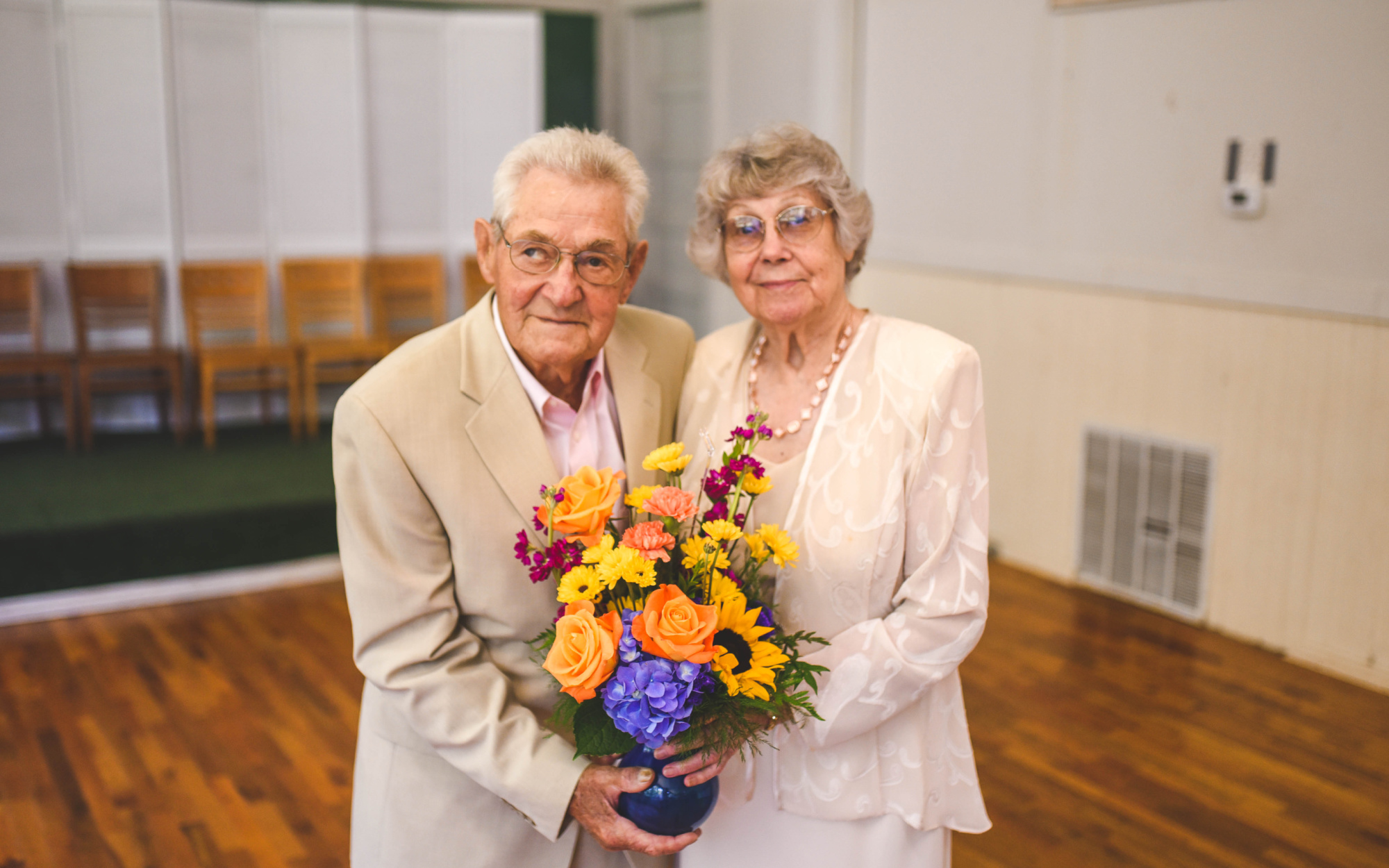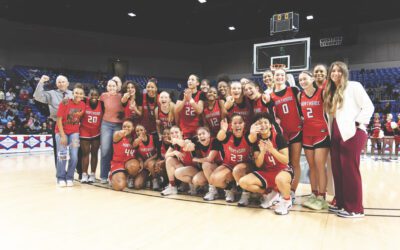Thell and Margie Ellison are believed to be the longest-married couple in the state. The Natural Dam couple was honored by the Arkansas Legislature earlier this year.
Eighty-three years after the fact, Margie Rose Ellison can still close her eyes and see the most important dress of her life. It was blue, handstitched by her aunt, her prettiest dress. She wore it to the midweek service at Pleasant Grove Freewill Baptist Church in the Lee Creek community of Crawford County, Arkansas. The dress had not gone unnoticed, at least not by Thell Ellison, who couldn’t take his eyes off her.
Margie Rose was sixteen, Thell was twenty-three, and they were in love. When the church service ended that night, a neighbor boy with a truck drove Margie and Thell to the Justice of the Peace to tie the knot. The date was June 24, 1941.
Today, Margie is sitting in her recliner. She is wearing a pink top and a skirt with a floral pattern. Her soft gray hair frames her lovely face. She looks decades younger than her ninety-nine years. Thell sits in a similar recliner in the Natural Dam home they’ve shared for decades. At 106, he is in remarkable shape. “I only take one pill a day,” he says.
Most days he spends in his workshop, making furniture from newly planed cedar from his neighbor’s sawmill. Several yards away is the garden that his daughters help tend. The night before, the couple had fresh corn and new potatoes with supper. Margie cooks two to three meals a day. “I’ll bet I’ve made a pond full of flour gravy over the years,” Margie says with a laugh. The way to a man’s heart might really be through his stomach. Margie has more than eighty years of proof.
Thell grew up working on his family’s farm near Lee Creek. They raised beans, grapes, apples, cotton, corn, potatoes, watermelon, and pumpkins. He got one pair of leather shoes a year, but they didn’t last too long.
“We worked in the rain. We worked in the snow,” Thell says. “Those leather shoes would get wet and come apart. I went barefoot about eleven months out of the year. We’d finish cotton about November 1, and we’d plant potatoes on February 14. We were lucky if the shoes lasted that long.”
He demonstrates the motion of sawing timber. “We didn’t have chainsaws, so me and my brother, just older than me, would clear the land using a hatchet and a cross saw.” Thell rakes his hand through his thick hair. “I was working while I was still in diapers.”
The community school Thell and Margie attended only went to the eighth grade. “That’s all we got,” Margie says. “That’s the way things were.”
Once the Ellisons married, they moved to a little log cabin. There was no electricity, no running water, and Margie cooked on a wood stove. But they had a fabulous dining table.
“Kids today think they have to have so much to get married. Well, I borrowed my dad’s wagon and mules,” Thell says. “There was a sawmill across the creek, and they had a slab pile full of pine. They said we could take all we wanted. I made a dining table and cabinets.”
He made furniture without a pattern or instruction. Margie was the same kind of self-starter. One of her first presents from Thell was a sewing machine and she became proficient at making clothes for the family and quilting.
In 1942, the Ellisons had a son, Ernest (now married sixty-two years himself). Four daughters followed in the years to come. One of those daughters, Wanda, died at thirty-one from cancer. “That was the hardest time of our life,” Margie says. Above Margie is a sign that reads Bless Our Home. Above the fireplace is a starburst clock, and on the walls is a multitude of family photos. “Wanda had two little girls,” Margie says, her voice shaky. “We leaned on each other, and our faith is strong. We are not perfect, but God is.”
The air in the house seems to still for a moment. The Ellisons’ daughter, Norma Shults, is sitting with her parents. When she speaks, it’s of happier times. “I didn’t have a store-bought dress until I was in the ninth grade.” Norma beams. “Mom could sew anything.
“Lee Creek was our swimming hole and our bathtub. Mom and Dad loved us unconditionally, when we were good, and when we weren’t. When it turned cold, Dad would find a bunch of icicles—we didn’t have a freezer. He’d bring them home in a tub, and Mom would make us homemade black walnut ice cream in front of the fireplace.” Norma holds her palms out. “We were free and happy.”
The Ellisons’ first vehicle was a Studebaker truck. They raised hogs, chickens, and sorghum cane to make sorghum. Norma became a great baker. The Sunday before their interview, she’d made two lemon cream pies for couples in their church who’d had wedding anniversaries. Thell, a deacon at Independence Freewill Baptist, also teaches an adult Sunday school class.
“Every Sunday, I’ll have his outfit put together, hanging up for him to find. I take care of him that way. I always got up early to make breakfast. I fix his lunch. Cook good suppers. Take care of his clothes,” says Margie.
“My mama was stricken with polio when she was thirty-six years old. I was twelve. That was a terrible hard time. Mother was paralyzed and in a wheelchair. Then, later on, my daddy got heart trouble and couldn’t take care of my mom. In 1977, we added on to our little house so they could move in. I’m so glad we could take care of them. They both lived to be ninety.”
Thell, dressed in a western shirt, jeans, and sturdy leather shoes, looks exactly like a man who would take care of his in-laws. “I’ve been blessed by two good women,” he says. “Margie is the ideal wife, and I know my mama loved me.”
He tries to control the quiver in his voice. “I don’t remember my mama. But I was told that while she was dying, I was playing on the floor beside her bed. She turned her head on her pillow and looked at me, and the last thing she said was, ‘God bless my curly-headed boy.’”
Thell, a lifelong farmer, wipes his eyes. “I’ve had a blessed life. The prettiest wife. The best children. We’ve had good health. Good meals. We had common sense. We lived off the land and listened to what our bodies needed.”
Just outside stands Thell’s workshop. Stacks of cedar planks, the bark still attached, lay on the floor. An old wall calendar lifts with the breeze. Near the door are two custom trestle tables he made for his kids. But none of that fills the room like the handmade pulpit in the corner. Its top is just big enough for Thell’s large Bible. When he wearies of working with his hands, he turns to the Good Book, where the words have guided him for more than a century.
Norma steps outside the house into a yard full of her mother’s flowers. The American flag is planted near the front walk. The monarch butterflies are out. Of her parents, she says, “They don’t make ‘em like that anymore.”
Margie doesn’t think she and Thell are anything remarkable. They married young, loved each other through thick and thin, and they loved the Lord. When they had children, they did their best to be a good example.
Thell remembers the first time he kissed Margie. He was walking her home. She turned toward him, and he kissed her cheek. She was the prettiest girl in the valley and would be his wife one day. He just knew it.
FAST FACTS ABOUT THE ELLISONS
Thell and Margie Ellison
Recognized as the longest-married couple in Arkansas
Married April 24, 1941
Five children
Fifteen grandchildren
Thirty-four great grandchildren
Twenty-nine spouses
112 in the Ellison family
WORDS Marla Cantrell
IMAGES courtesy Thell and Margie Ellison and Arkansas Secretary of State




